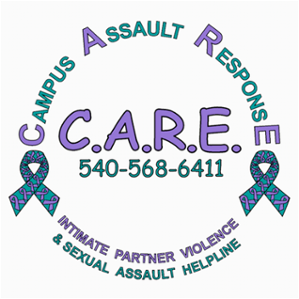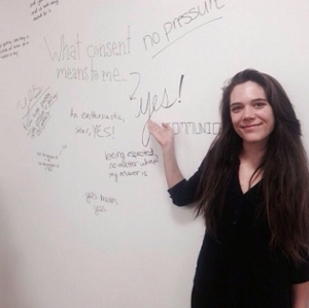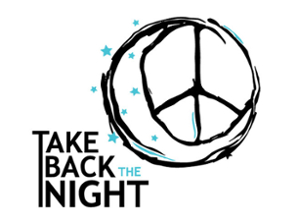Responding to Campus Assault with Campus Assault ResponsE
Ethical Reasoning in Action There are a variety of organizations at JMU that strive to help college students with the struggles they face, but CARE is one of a kind. CARE, which stands for Campus Assault ResponsE, is a 24/7 helpline for people to share their stories on sexual assault or intimate partner violence. Callers can get access to information about reporting, counseling, and legal processes, or simply call in just to have someone who will listen. The helpline is open to all JMU students, whether they are victims or the victims’ family and friends. Callers can anonymously share their stories and also have the option of receiving information on the JMU judicial process, the Harrisonburg Police, and Title IX. This organization was even recently featured in the JMU student blog, The Daily Duke as well as in JMU’s student-run newspaper, The Breeze.
There are a variety of organizations at JMU that strive to help college students with the struggles they face, but CARE is one of a kind. CARE, which stands for Campus Assault ResponsE, is a 24/7 helpline for people to share their stories on sexual assault or intimate partner violence. Callers can get access to information about reporting, counseling, and legal processes, or simply call in just to have someone who will listen. The helpline is open to all JMU students, whether they are victims or the victims’ family and friends. Callers can anonymously share their stories and also have the option of receiving information on the JMU judicial process, the Harrisonburg Police, and Title IX. This organization was even recently featured in the JMU student blog, The Daily Duke as well as in JMU’s student-run newspaper, The Breeze.
CARE started in 2000 as the only 24/7 service of its kind in Virginia. The 30 trained students at JMU cover helpline shifts based on volunteers’ availability. Helplines such as this one are rare on college campuses because they are hard to staff and have the potential of facing liability issues. However, CARE officers and volunteers feel that raising awareness and providing support for victims of sexual assault is worth their time and effort. In TIME magazine, a survey was conducted by the Senate that found only 41% of all universities have initiated investigations into sexual assault claims, while the majority defaulted to victim blaming (qtd. In Dockterman, 2015). Clearly, handling sexual assault cases is a serious issue on college campuses, especially with the ongoing investigations regarding Title IX violations in higher education. Luckily for JMU, CARE cares too much to let this issue slip under the radar.
In order to raise awareness, CARE hosts speakers, such as survivors or field experts, to talk about sexual assault. It also provides dorm education sessions on sexual assault prevention methods. One of the main educational missions of CARE is to clear up the misconceptions of sexual assault. Charity O’Connor, president of CARE, shared some of the common myths: Victims are usually thought to be straight, white females, but the truth is that victims come from all genders, races, and sexual orientations. On the flip side, perpetrators are usually thought to be men, but in reality, anyone can be a perpetrator. O’Connor hopes that CARE can shed light on this taboo issue and, by debunking the myths, initiate a cultural shift on campus away from victim blaming.
There are other events and groups that are advocating against sexual assault on JMU’s campus. In addition to being president of CARE, O’Connor is in charge of the Red Flag Campaign and Take Back the Night, a program sponsored by the JMU Health Center. While the Red Flag Campaign is a group that focuses on dating violence and bystander intervention, Take Back the Night is an annual event dedicated to raising awareness about sexual assault in general. Other campaigns against sexual assault include: It’s On Us, a national prevention campaign, and NO MORE, a campaign against domestic violence. The Clothesline Project illustrates how sexual assault has affected the JMU community with anonymous accounts written on t-shirts. There is even a program geared specifically for first-year students called Dukes Step Up! which is designed to train them on being active bystanders at JMU.
Sexual assault support and prevention can be found off-campus in the Harrisonburg community, too. The Collins Center is a community-based center that “promotes the prevention of child sexual abuse, and provides excellence in sexual assault response and treatment in Harrisonburg and Rockingham County” (“Our Mission”). CARE President Charity O’Connor had the opportunity to intern for this center over the summer. Her duties consisted of making training documents, creating orientation guides, and organizing data for programs such as Sexual Assault Crisis Services, Prevention and Education, Mental Health Treatment, and the Child Advocacy Center. Now with her part-time position, she continues assisting with all the programs the center offers, wherever she is needed.
When asked how her experience at The Collins Center differs from her involvement in CARE, O’Connor stated, “The Collins Center serves a larger population as well as a larger range of ages. While CARE is mostly a helpline and sexual assault education program, The Collins Center is more of a treatment and advocacy program.”
O’Connor also has a Substance Abuse Prevention minor, which she believes will tie in with her mission against sexual assault: “I’ve always wanted to work for a non-profit against sexual assault, and I wanted a health-based prevention background. Substances are often involved in sexual assault cases, and having the knowledge of substance abuse prevention will be good for interventions.” With alcohol being a factor in 40% of all violent crimes today, substance abuse prevention plays a huge role in combatting sexual assault (National Council on Alcoholism and Drug Dependence, Inc.).
As members of the JMU community, we all have a responsibility to be educated on the signs and prevention methods of sexual assault. When talking about such a sensitive topic, it is important to keep empathy in mind. Friends, family, and hotline counselors should support a victim by listening without pushing the victim outside their comfort zone. It is important to think about the outcomes the survivors want, and respect the decisions they make. Confidentiality, respect, and accessible resources are all rights that sexual assault victims should have. Their liberty should be another one of their rights, which can be retained by giving victims the option of reporting, rather than forcing them to report or reporting it for them. Empathy, Outcomes, Rights, and Liberty are just some of the 8 Key Questions that are involved in a sexual assault situation. These universal ethical guidelines can help us effectively and compassionately address such a sensitive issue. With enough awareness, we can combat the myths, stop the victim blaming, and perhaps prevent some sexual assault cases from even taking place.
 April is Sexual Assault Awareness Month, a time to raise awareness about sexual assault and to educate our community about how to prevent it. JMU is hosting several events in recognition of this month including The Clothesline Project and Take Back the Night. The Clothesline Project will take place on Monday, April 6th from 12:00 PM –8:00 PM, Tuesday, April 7th from 10:00 AM—5:30 PM, and Wednesday, April 8th from 9:00 AM–2:00 PM in Madison Union Ballroom in Warren. Take Back the Night will take place on Tuesday, April 7th from 6:00 to 9:00 PM at Grafton-Stovall Theater. Sponsored by the Office of Residence Life and the University Health Center, please join our campus community for these educational and empowering events.
April is Sexual Assault Awareness Month, a time to raise awareness about sexual assault and to educate our community about how to prevent it. JMU is hosting several events in recognition of this month including The Clothesline Project and Take Back the Night. The Clothesline Project will take place on Monday, April 6th from 12:00 PM –8:00 PM, Tuesday, April 7th from 10:00 AM—5:30 PM, and Wednesday, April 8th from 9:00 AM–2:00 PM in Madison Union Ballroom in Warren. Take Back the Night will take place on Tuesday, April 7th from 6:00 to 9:00 PM at Grafton-Stovall Theater. Sponsored by the Office of Residence Life and the University Health Center, please join our campus community for these educational and empowering events.

